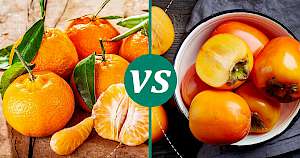Persimmon vs Mandarin (Tangerine): Nutrition Showdown
Where is more calories, protein, carbs - what is more healthy?


Mandarin vs Persimmon: Nutrition Comparison
| per 100g | Persimmon | Mandarin (Tangerine) |
|---|---|---|
| Calories | 70 | 53 |
| Carbohydrates | 18.59 g | 13.34 g |
| Dietary fiber | 3.6 g | 1.8 g |
| Protein | 0.58 g | 0.81 g |
| Calcium | 8 mg | 37 mg |
| Iron | 0.15 mg | 0.15 mg |
| Magnessium | 9 mg | 12 mg |
| Potassium | 161 mg | 166 mg |
| Sodium | 1 mg | 2 mg |
| Vitaminium B1 (Thiamine) | 0.03 mg | 0.058 mg |
| Vitaminium B2 (riboflavin) | 0.02 mg | 0.036 mg |
| Vitaminium B3 (Niacin) | 0.1 mg | 0.376 mg |
| Vitaminium B6 | 0.1 mg | 0.078 mg |
| Vitaminium B9 (Folic acid) | 8 mg | 0.016 mg |
| Vitaminium C | 7.5 mg | 26.7 mg |
| Vitaminium E | 0.73 mg | 0.2 mg |
| Beta karoten | 253 mg | 101 mg |
More Calories in Persimmon
At first glance, you can see that in persimmon is more calories than in mandarin.
Persimmon has 70 kcal per 100g and mandarin 53 kcal per 100g so it is pretty easy to calculate that the difference is about 32%.
In persimmon and in mandarin most calories came from carbs.
See tables below to compare persimmon with mandarin in details.
Persimmon And Mandarin Nutrition Difference
- Calories:
persimmon - 32% more than mandarin - Carbohydrates:
persimmon - 39% more than mandarin - Dietary fiber:
persimmon - 100% more than mandarin - Protein:
mandarin - 40% more than persimmon
Less protein in persimmon
It is aslo easy to see see that in persimmon is less protein than in mandarin.
There is 0.81g per 100g of mandarin and 0.58g per 100g of persimmon so using simple math we can see that difference is about 40%.
More carbohydrates in persimmon
In persimmon is more carbohydrates than in mandarin.
There is 13.34g/100g of carbohydrates in mandarin and 18.59g/100g in persimmon so let me do the math for you again - difference is about 39%.
Persimmon
70kcal- Calories70
- Carbohydrates18.59 g
- Dietary fiber3.6 g
- Protein0.58 g
100g | ounce | single piece | cup | half cup
Calories source
- 97% CARBS.
- 3% PROTEIN
- 0% FAT
Mandarin (Tangerine)
53kcal- Calories53
- Carbohydrates13.34 g
- Dietary fiber1.8 g
- Protein0.81 g
100g | ounce | single piece | cup | half cup
Calories source
- 90% CARBS
- 5% PROTEIN
- 5% FAT
Vitamins: mandarin vs persimmon
- Vitaminium B1 (Thiamine):
mandarin - 93% more than persimmon - Vitaminium B2 (riboflavin):
mandarin - 80% more than persimmon - Vitaminium B3 (Niacin):
mandarin - 276% more than persimmon - Vitaminium B6:
persimmon - 28% more than mandarin - Vitaminium B9 (Folic acid):
persimmon - 49900% more than mandarin - Vitaminium C:
mandarin - 256% more than persimmon - Vitaminium E:
persimmon - 265% more than mandarin - Beta karoten:
persimmon - 150% more than mandarin
Minerals: persimmon vs mandarin
- Calcium:
mandarin - 363% more than persimmon - Iron:
mandarin - 0% more than persimmon - Magnessium:
mandarin - 33% more than persimmon - Potassium:
mandarin - 3% more than persimmon - Sodium:
mandarin - 100% more than persimmon
Compares of persimmon
- Persimmon vs Apple
- Persimmon vs Apricot
- Persimmon vs Avocado
- Persimmon vs Banana
- Persimmon vs Fig
- Persimmon vs Gooseberry
- see all compares of persimmon
Compares of mandarin
Read also:
- Calories from Persimmon
- Calories of Pineapple
- Calories in Plum
- Pomegranate calories per 100g
- Quince fruit carbs per 100g
- Raspberry protein per 100g
- Sapodilla fat per 100g
- How many calories does carambola have?
- Calories in a half of mandarin
- Calories in whole mandarin
- Calories for one, two or more tangerines
- How much protein in watermelon?
Marcin Piotrowicz
calories-info.com creator
Healthy diet and healthy lifestyle promoter
Add comment